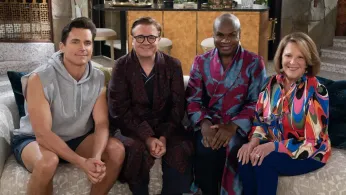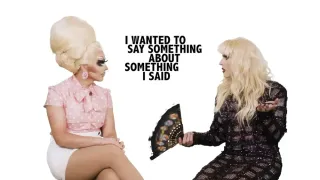
7 hours ago
Hulu Cancels “Mid-Century Modern” After One Season
READ TIME: 3 MIN.
In a move that has left both fans and industry insiders disappointed, Hulu confirmed the cancellation of “Mid-Century Modern” shortly after its debut season wrapped in September 2025. The series, co-created by Max Mutchnick and David Kohan—best known for the trailblazing “Will & Grace”—and produced by Ryan Murphy, was lauded for its clever writing, diverse cast, and unapologetically queer sensibility. With an impressive 88% critics’ score on Rotten Tomatoes, the show quickly built a devoted following within the LGBTQ+ community, celebrated for its nuanced portrayal of chosen families and mature queer identities .
Set against the sun-drenched backdrop of Palm Springs, “Mid-Century Modern” followed a group of friends—played by Matt Bomer, Nathan Lane, Nathan Lee Graham, and the late Linda Lavin—as they navigated love, loss, and laughter in their golden years. Its retro-flavored, multi-camera format paid homage to sitcom classics like “The Golden Girls,” while injecting fresh perspectives on aging, sexuality, and community. LGBTQ+ critics and viewers alike praised the series for centering older queer characters, a demographic rarely given the spotlight in mainstream television .
Despite its critical success, Hulu’s decision to pull the plug was reportedly based on low audience engagement and the imminent expiration of cast contracts. Industry outlets such as Deadline and Variety have pointed to the show’s niche appeal and the challenges facing multi-camera sitcoms in today’s streaming environment, where platforms increasingly prioritize event series, franchise extensions, and unscripted content to boost quick subscriber numbers .
The cancellation was confirmed in an emotional social media statement by showrunner Max Mutchnick, who wrote on Instagram: “Ten great episodes... Not enough. But we loved making every single one of them. We’re gonna miss our very special show. Thanks to everyone who watched.” . Creator and cast member Dan Bucatinsky responded: “We became a family to create a tv show about chosen family. And nobody can take that away from us. It was magical. And filled Linda Lavin with so much joy at the end of her life. This was a blessing on a blessing! Grateful to have been a part of it!!” .
The series’ final episodes aired just days after the death of Linda Lavin, whose Emmy-winning career and vibrant performance lent depth and authenticity to the ensemble. The loss of Lavin was not only a personal blow to the cast but also added a sense of melancholy to the show’s abrupt ending .
“Mid-Century Modern” stood out for its commitment to reflecting the lived experiences of LGBTQ+ people, particularly those whose stories have often been sidelined in mainstream media. By centering older queer characters, the show challenged stereotypes and broadened the narrative possibilities for television audiences. Its cancellation raises larger questions about the sustainability of niche, inclusive programming in an era of “Peak TV” contraction, where critical acclaim does not always translate into longevity .
Fans and advocacy groups have expressed concern that streaming platforms’ increasing focus on mass-market, event-driven content could further limit opportunities for authentic queer storytelling. For many viewers, “Mid-Century Modern” offered a rare glimpse into the complexities of LGBTQ+ aging, friendship, and resilience—topics that remain underexplored as network priorities shift.
Social media has been flooded with tributes from viewers, cast members, and LGBTQ+ organizations, celebrating the show’s humor, heart, and historic importance. The series has inspired conversations about chosen families, intergenerational solidarity, and the value of representation across the spectrum of queer identities. As Dan Bucatinsky remarked, “We became a family to create a tv show about chosen family. And nobody can take that away from us.”
While Hulu has yet to release detailed viewership data or a thorough post-mortem, the consensus among industry experts is clear: the cancellation of “Mid-Century Modern” is emblematic of broader challenges facing inclusive, risk-taking programming in today’s streaming landscape. Advocacy organizations hope the show’s legacy will inspire future projects and encourage platforms to consider the unique needs and interests of LGBTQ+ audiences when making programming decisions .
As fans and creators alike mourn the loss of “Mid-Century Modern,” the call for more diverse, inclusive content continues. The show’s brief run stands as both a testament to the power of queer storytelling and a reminder of the work yet to be done in ensuring lasting representation on screen. For LGBTQ+ audiences, the series offered not just entertainment, but validation, connection, and hope—a legacy that endures even as the credits roll.






